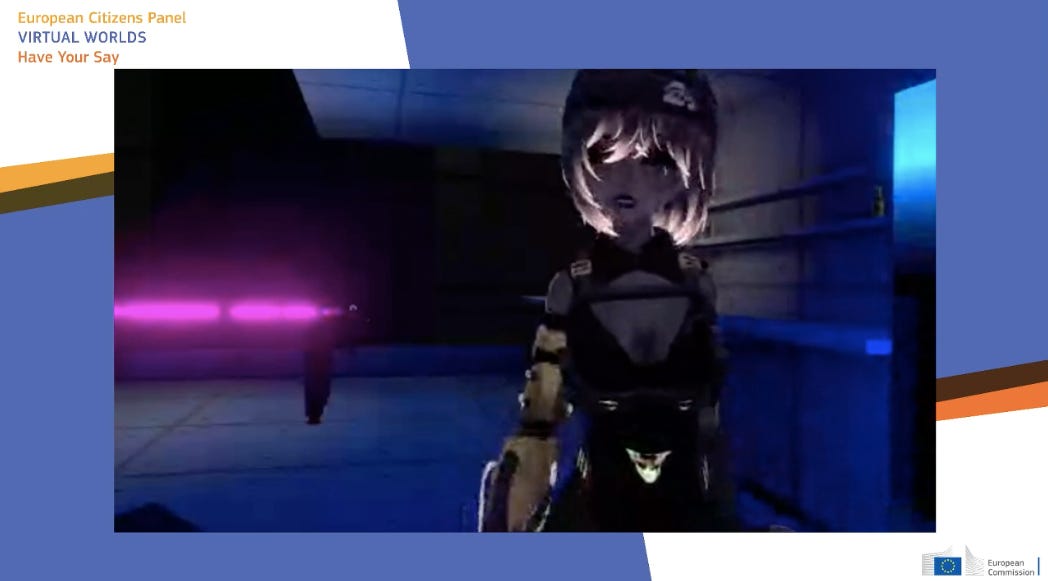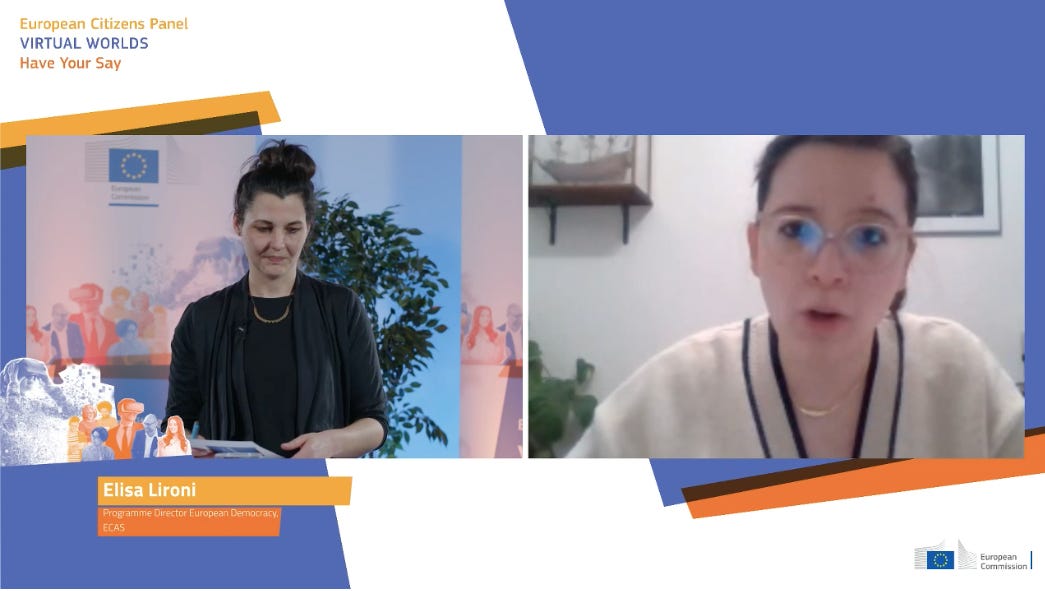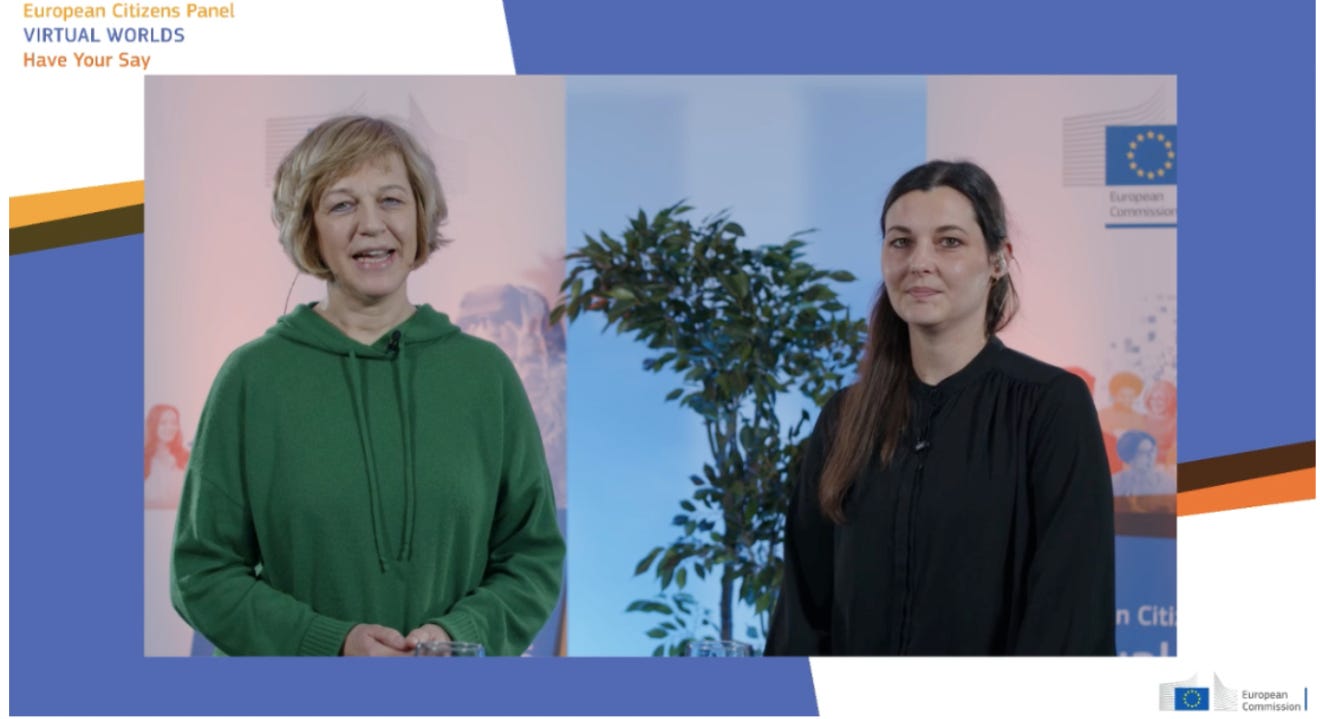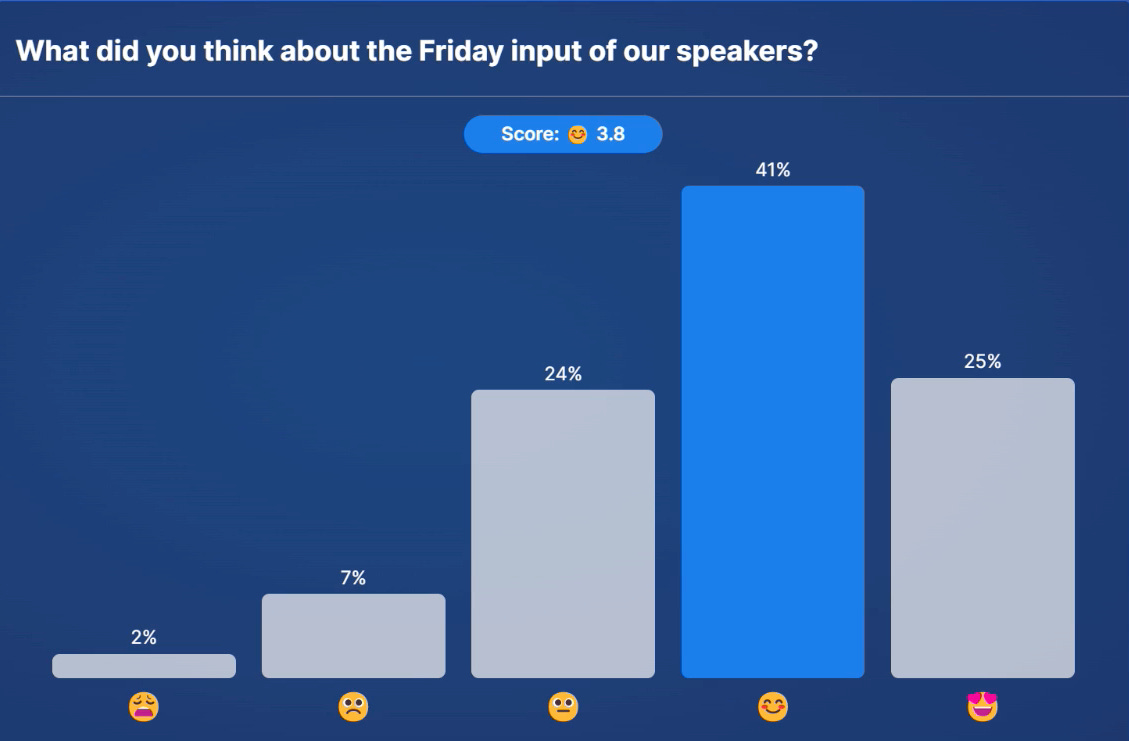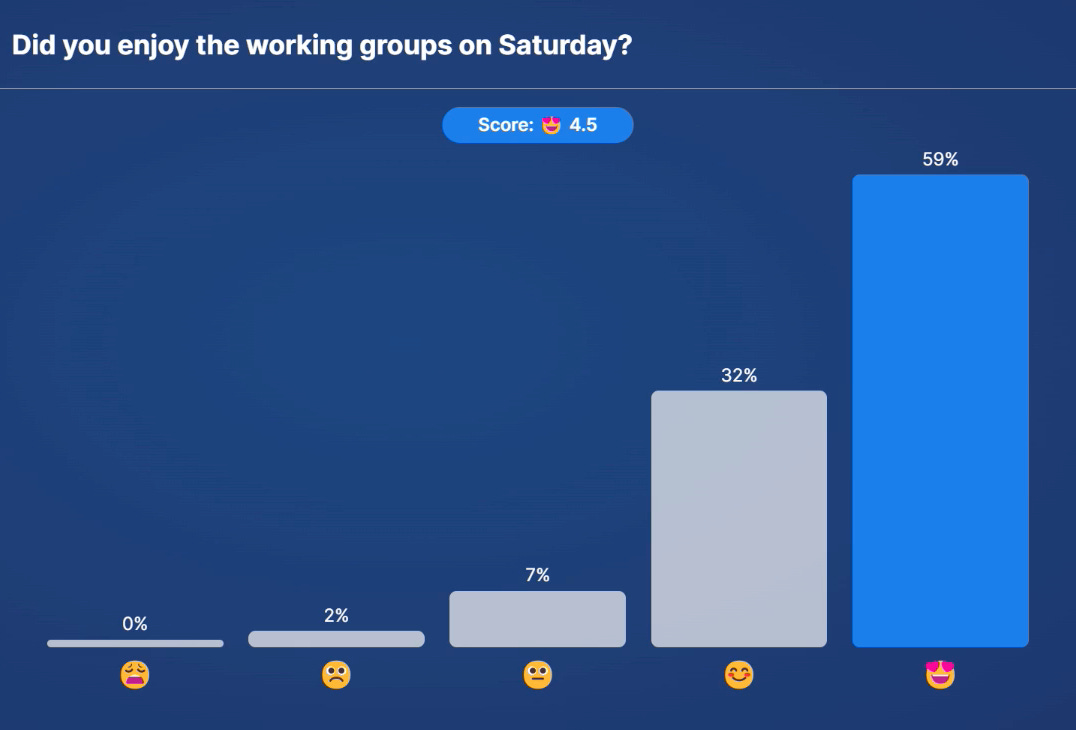What’s going on, again?
The EU ordered a citizens' panel—a big focus group—on virtual worlds (breakdown of the panel’s demography)
Citizens’ recommendations will influence the EU’s first communication on the metaverse, due end of May 2023.
The panel spent the first session learning about the metaverse (Session 1 debrief)
Programme
Session 2 was wholly online and partly took place on Hyperfair, a virtual platform.

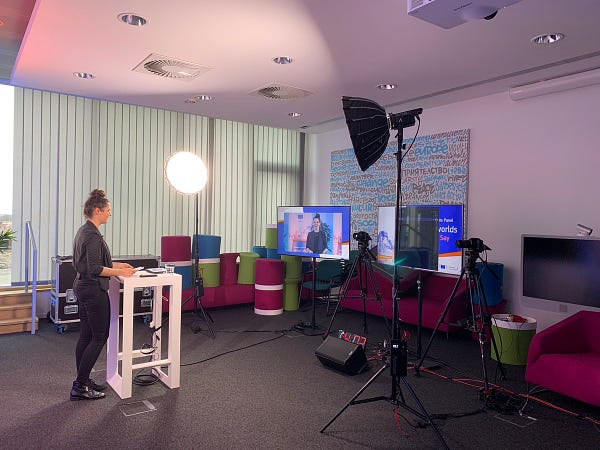
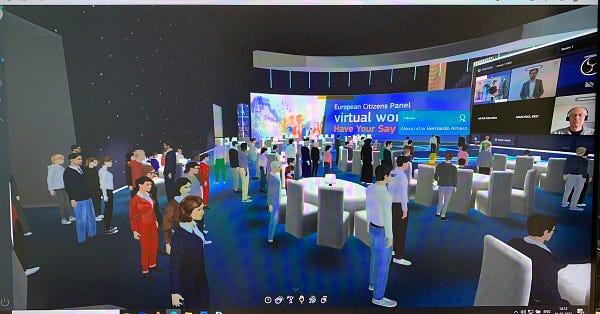
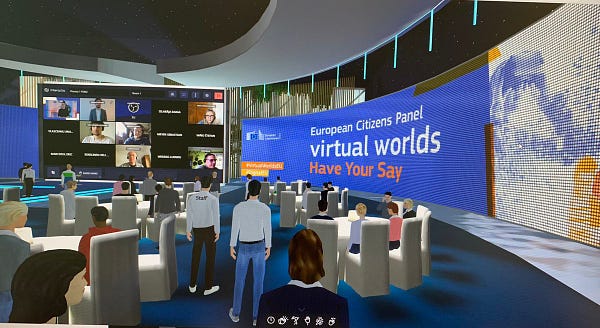
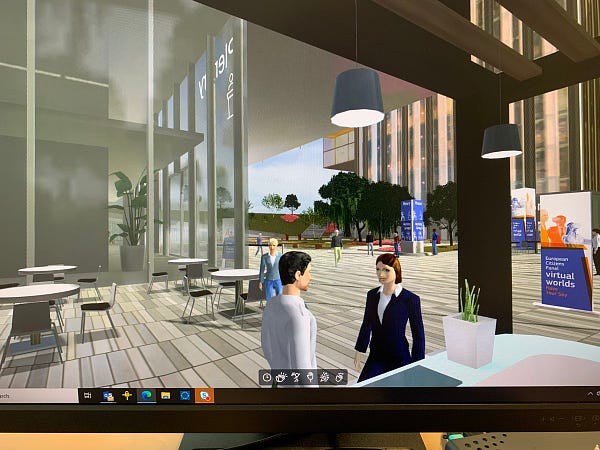
Day 1: Friday
Since Session 1, citizens gathered lots of questions. The panel’s organisers sorted over 200 into four themes which comprised the agenda for the day. Experts spoke about each theme and took questions.
Economy, jobs & business
First up, Harmen van Sprang from the Sharing Cities Alliance and Eric Marchiol from Renault. Harmen spoke about the importance of cities in metaverse-building. Eric presented Renault’s vision for an industrial metaverse:
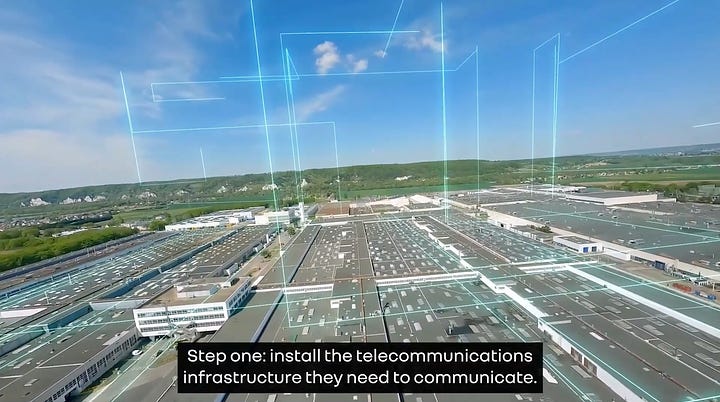
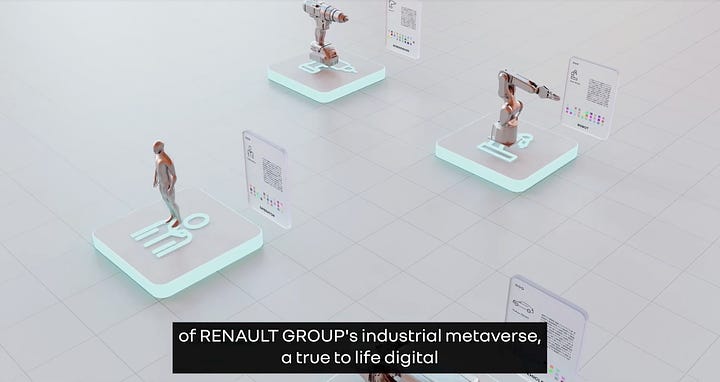
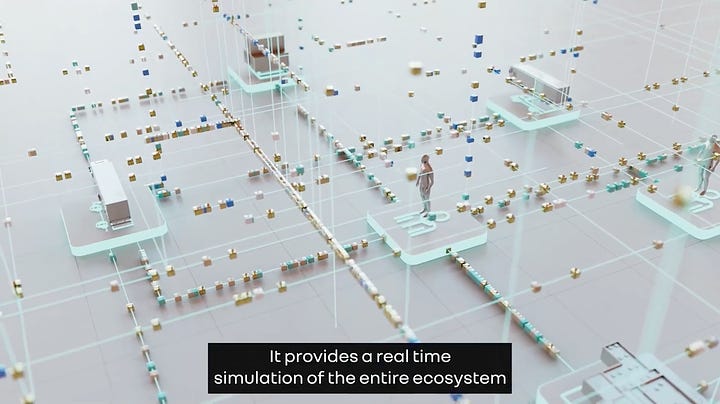
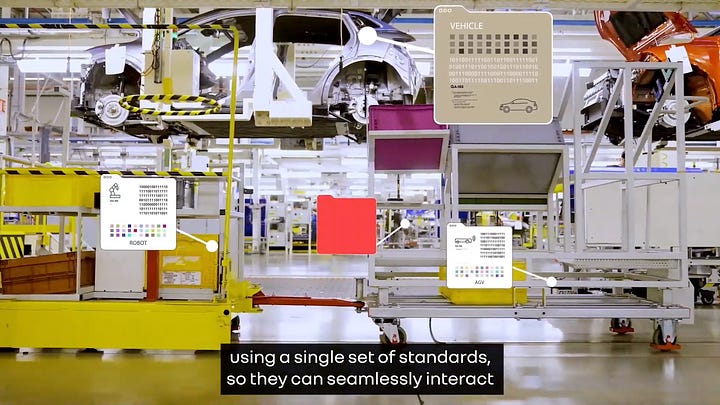
Organisers’ Q: What should the citizens focus on?
Eric: “We should focus on how the EU can help us standardize.”
Harmen: We should first try and experience these tools for ourselves.
Technical difficulties prevented audience questions (more on this later.)
Safety & Security
Next up, Mariëtte van Huisjtee of the Rathenau Insitute and Fabien Bénétou, a WebXR consultant.
For Mariëtte, the “two clearest risks” are identity theft and fraud—“it may be hard to know who is who.”
Fabien warned about “gigantic companies” trading data in the metaverse. “We are [already] being exploited.”
Audience Q: How should rules and laws apply when we become avatars in virtual worlds?
Mariette: No set answers… How much anonymity we want to allow in the metaverse is “one of the most interesting questions of our time.”
Fabien: Rules will be server-based: whoever is hosting users will be responsible for their behaviour.
Organisers’ Q: What’s the biggest nut to crack?
Mariette: Public spaces. “We might not see the same thing if we walk the street together. Do we need a common perception of what’s real?”
Fabien: It will be difficult to let go of things we’re used to, like anonymity, which might not be possible in virtual spaces.
Health and wellbeing / the Environment
Sara Lisa Vogl, a visual artist who joined as an avatar, explained how immersion in virtual experiences will affect our real lives and behaviour.
Organisers’ Q: What would you tell parents worried their kids will be zombified in the metaverse?
Sara: Our phones have already zombified us! Virtual reality is closer to the real world: You make the time—“it’s an effort to come here, you know!”—and there are fewer distractions.
Bruno Thomas of the International Consortium of Investigative Journalists spoke about environmental implications and the need to scrutinise the full life cycle of metaverse products.
Society, inclusivity, and accessibility
Elisa Lironi from the European Citizen Action Service and Matthias C. Kettemann of the Hans Bredow Institute spoke about societal impacts.
Elisa advised citizens to “focus on how the metaverse can benefit society,” said the EU should not forget about vulnerable groups, and advocated for inclusionary design. For example, headsets causing motion sickness exclude users (and disproportionately affects women.) Digital literacy can ensure people are not left behind.
Audience chat feed: “How is this supposed to work, no one should be left behind? Should the technical requirements be sponsored by the EU?”
Matthias Kettemann flagged challenges governing the metaverse and conceded that you “can’t solve human interactions.” He advocated for a global discourse. But more important than rules, he stressed, is who sets them.
Audience chat feed: “Do you think authoritarian countries would even fully allow the Metaverse in the first place, if there are already rules in place when it comes to the usage of social media?”
Presentation of the EU Digitial Rights and Principles
Yvo Volman, Director of Data at the European Commission presented the Declaration on European Digital Rights and Principles. Yvo said these principles root existing regulation: “We have rules for the metaverse, the AI Act, DSA, DME—these are future proof.”
Cathrine Hasse from the University of Aarhus closed the session by noting that the world will look to the EU to learn from this initiative.
Day 2: Saturday
The second day was not public but invited observers could follow 12 simultaneous workshops, group chats, and shared documents. Consider what follows with the caveat that observers could not capture everything.
The groups discussed the themes from the first day and agreed on “three core values.” One document suggested the 12 groups together came up with nine distinct values. Overheard/read thoughts on each:
Freedom of choice
“There must be alternatives in the real world. We shouldn’t be forced to use the metaverse.”
Transparency
One group wrote, “Better communication and information sharing with citizens to increase understanding of data protection, cookies and the opportunities/dangers in the metaverse.”
Education and literacy
“We need upskilling, training”
One participant suggested public billboards with QR codes to educate people.
Inclusion (accessibility, solidarity, equality)
“All people should be able to access virtual worlds. They should be publicly available. Poor or rich, country or city.”
Sustainability
“It should help reduce the impact on the environment.”
Citizens should “have the knowledge and tools to use the metaverse sustainably.”
Safe & Secure
Rules should be in place such that “we feel free and safe, although we are all responsible for our own behaviour.”
“You smoke it’s your own responsibility. You spend 100 hours in the metaverse, it’s your own responsibility”
Justice
“We need cooperation among national justice and police systems.”
“We need to consent to how our data is used.”
Human-centric
“Will I have to leave a testimony to my sons and daughters to please kill my avatars?”
“My biggest worry is that large companies will bulldoze over us.”
Health
One participant warned about potential addictions to the metaverse.
Another suggested regular health checks to ensure people could still distinguish real from virtual.
Day 3: Sunday
Now for the fun part: Citizens started converting their agreed values into concrete actions to present at a plenary later in the day.
The plenary started with an interview with Renate Nikolay (left), Deputy Director General of the European Commission’s tech department.
Contrasting with the tone of her colleague Yvo Volman from Friday, who said the EU was open to working with third countries, Renate declared, “We should it our own way; that’s what this has all led to.” Also contra Yvo, Renate described the internet as a “wild west,” and this initiative is a precursor to regulation.
Citizens then presented their recommendations according to 4 themes. Below combines the presenting groups’ actions with others’ heard earlier in the day.
Economy, jobs & business
Give every citizen the same access to the metaverse regardless of their background.
Fund technologies and innovative solutions for both smaller and larger companies.
Focus funding on health and the environment.
Provide equal access and opportunities to establish a business.
Support SMEs and ensure anti-trust rules work.
Establish rules for compliance in the metaverse, nationally and internationally.
E.g., a rule on maximum hours workers must spend in the metaverse.
Define different rules for platforms providing the metaverse as a service and those companies using it for business activities.
Safety & Security
Check providers protect users at 3 levels: recreation, commerce, and public administration.
Prioritise the safety of users above all else.
Ensure safety and security systems are easy to understand, accessible and non-discriminatory.
Authenticate and approve all avatars.
And yes, avatars should be able to die.
Provide safety indicators for websites and platforms.
Verify institutions and organizations.
Allow different levels of anonymity for different domains.
Health & wellbeing / the Environment
Run campaigns for citizens to learn and use virtual devices.
Recycle metaverse hardware.
Create clear indicators that measure different environmental, social and health impacts of the metaverse.
Research possible addictions and effects on vulnerable groups.
Society, inclusivity, accessibility
Give people the freedom to those that do not want to access or be identified in the metaverse.
Make sure policies on the metaverse are made transparently.
Include all groups of society: minorities, urban-rural divide, etc.
Rehena Schwinninger-Ladak, head of the Commission’s metaverse work shared her thoughts and advised the citizens to narrow their actions, focus on the novelty of virtual worlds (vs. digital in general), and separate expectations for national governments and the EU.
Frank Steinicke of the University of Hamburg also summarised the session, advising the citizens to narrow the topics and consider how values relate, interact, and sometimes contradict. He recommended the EU look at legislative gaps and areas that need commercial investment.
Analysis
The good
Steps forward
The second session offered the citizens plenty of time to share their thoughts and offer concrete recommendations.
The panel touched on issues that will immediately affect the citizenry, including disabled access, inclusion and ensuring no one is left behind.
The Commission's advice throughout was primarily descriptive, reminding the citizens of the executive’s mandate, rather than normative.
Feedback
Citizens polled favourably based both on their experience of the metaverse platform and overall session.
The bad
Connectivity, connectivity, connectivity
Technical issues plagued all three days. Many participants could not join the metaverse platform. In the plenary, shortcomings meant audience questions had to be skipped and some participants suffered heavy delays in joining. In every one of the 12 workshops, there were cases where participants experienced glitches.
Today’s inadequate connectivity sobered talk of tomorrow’s metaverse. As one participant cheekily commented, “We need a better Internet connection. Without this, no way to make a virtual reality ;)”
In other cases, the hosting platform was to blame. This initiative insisted on using EU companies—but the best products are outside the bloc. Technical shortcomings exposed this inconvenient truth and foreshadowed debates on metaverse development.
What’s in a word?
It’s time to drop the “virtual worlds” gambit. Except for Matthias Kettemann, each expert referred mostly or entirely to “the metaverse.” As did the panel’s organisers, invited companies, citizens, and the EU’s own staff.
A non-cynical reason the EU might want to avoid the “m” word is that it’s too broad. According to the panel’s info pack, the “metaverse” refers to “a network of virtual worlds.” “Metaverses,” meanwhile, are virtual worlds that also include augmented reality. At first glance, zooming in on “virtual worlds” was prudent to prevent scope creep.
But this is misguided. The EU’s policy priorities and many of its panels’ concerns—fair competition, interoperability, data sharing, and environmental impacts—are more relevant to the broader “metaverse” concept, not individual virtual worlds. Meanwhile, leaving AR out of scope neglects the products most relevant to EU citizens.
“Metaverse” is a significantly more popular term than “virtual worlds” and is already used by governments, including South Korea and Dubai. Meanwhile, “metaverses” is as prominent as “internets.” Semantics matter when forming policy and for interoperability. It’s time the EU endorsed the dreaded “m” word, lest they continue to confuse.
Related terms: “Web3,” a kind of manifesto for the next internet; “Extended reality (XR),” a term for the new generation of immersive technology (AR + VR + MR.)
The regulatory?
An interesting theme to look out for is private vs. public spaces. Citizens were occasionally lax regarding the former but had high expectations for the latter.
The panel still needs to get at the unique features of the metaverse. As Rehana Schwinninger-Ladak said at the end, much of the discussion could have referred to internet policy generally. As the lead for the forthcoming policy communication, her final framing could indicate the next starting point:
People
Protection through regulations and guidance.
Education & skills. Upskilling, reskilling, awareness.
Make it more user-friendly and appealing.
Digital ID, tied into upcoming EU initiative.
Language barriers, possible technical solutions.
Disability access.
Industries
Fair market conditions for all players, inc. SMEs and start-ups.
Infrastructure
Connectivity.
21-23 April. In the final session, participants will “develop a catalogue of preferred actions towards the development of desirable virtual worlds.” Stay tuned.



